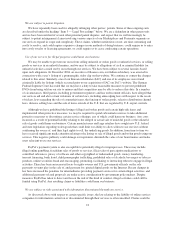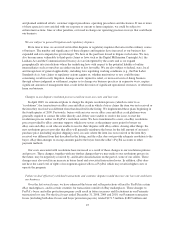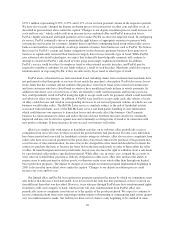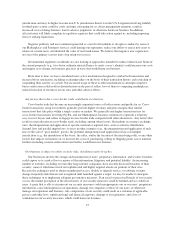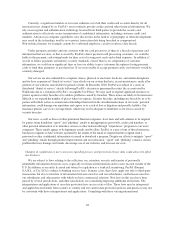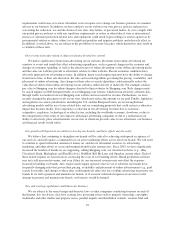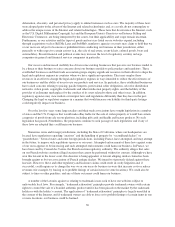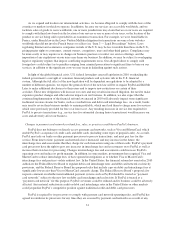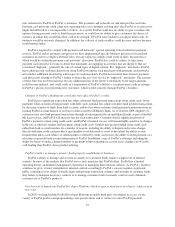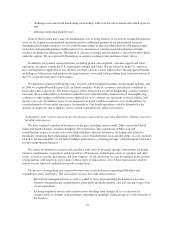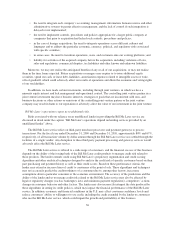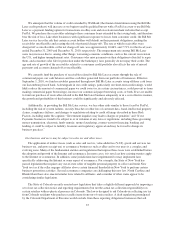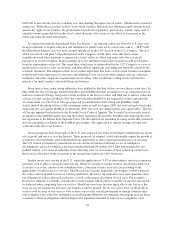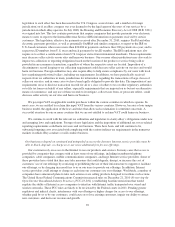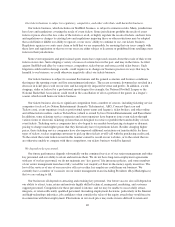eBay 2010 Annual Report Download - page 37
Download and view the complete annual report
Please find page 37 of the 2010 eBay annual report below. You can navigate through the pages in the report by either clicking on the pages listed below, or by using the keyword search tool below to find specific information within the annual report.rule violations by PayPal or PayPal’s customers. The payment card networks set and interpret the card rules.
Payment card networks could adopt new operating rules or re-interpret existing rules that PayPal or its processors
might find difficult or even impossible to follow. As a result, PayPal could lose its ability to give customers the
option of using payment cards to fund their payments, or could lose its ability to give customers the choice of
currency in which they would like their card to be charged. If PayPal were unable to accept payment cards, its
business would be seriously damaged. In addition, the velocity of trade on eBay could decrease and our business
would further suffer.
PayPal is required to comply with payment card networks’ special operating rules for Internet payment
services. PayPal and its payment card processors have implemented specific business processes for merchant
customers in order to comply with these rules, but any failure to comply could result in fines, the amount of
which would be within the payment card networks’ discretion. PayPal also could be subject to fines from
payment card networks if it fails to detect that merchants are engaging in activities that are illegal or that are
considered “high risk,” primarily the sale of certain types of digital content. For “high risk” merchants, PayPal
must either prevent such merchants from using PayPal or register such merchants with payment card networks
and conduct additional monitoring with respect to such merchants. PayPal has incurred fines from its payment
card processors relating to PayPal’s failure to detect the use of its service by “high risk” merchants. The amount
of these fines has not been material, but any additional fines in the future would likely be for larger amounts,
could become material, and could result in a termination of PayPal’s ability to accept payment cards or changes
in PayPal’s process for registering new customers, which would seriously damage PayPal’s business.
Changes in PayPal’s funding mix could adversely affect PayPal’s results.
PayPal pays significant transaction fees when customers fund payment transactions using credit cards, lower
payments when customers fund payments with debit cards, nominal fees when customers fund payment transactions
by electronic transfer of funds from bank accounts, and no fees when customers fund payment transactions from an
existing PayPal account balance or use buyer credit issued by GE Money Bank. As of October 2009, eligible U.S.
customers may also fund payment transactions through a loan originated by an unaffiliated lender as part of the Bill
Me Later service, and PayPal will incur no fees for such transactions. Customers fund a significant portion of
PayPal’s payment volume using credit cards, and PayPal’s financial success will remain highly sensitive to changes
in the rate at which its senders fund payments using credit cards. Senders may prefer funding using credit cards
rather than bank account transfers for a number of reasons, including the ability to dispute and reverse charges
directly with their credit card provider if merchandise is not delivered or is not as described, the ability to earn
frequent flier miles, cash rebates, or other incentives offered by credit card issuers, the ability to defer payment, or a
reluctance to provide bank account information to PayPal. In addition, some of PayPal’s offerings, including the
ability for buyers to make a limited number of payments without opening an account, have a higher rate of credit
card funding than PayPal’s basic product offering.
PayPal’s failure to manage customer funds properly would harm its business.
PayPal’s ability to manage and account accurately for customer funds requires a high level of internal
controls. In some of the markets that PayPal serves and currencies that PayPal offers, PayPal has a limited
operating history and limited management experience in managing these internal controls. As PayPal’s business
continues to grow, it must strengthen its internal controls accordingly. PayPal’s success requires significant
public confidence in its ability to handle large and growing transaction volumes and amounts of customer funds.
Any failure to maintain necessary controls or to manage customer funds accurately could severely diminish
customer use of PayPal’s products.
Our decision to launch our PayPal Developer Platform, which is open to third-party developers, subjects us to
new risks.
In 2009, we launched the PayPal Developer Platform to enable third party developers to access a wide
variety of PayPal product and programming code specifications and to connect to select PayPal payment
32



